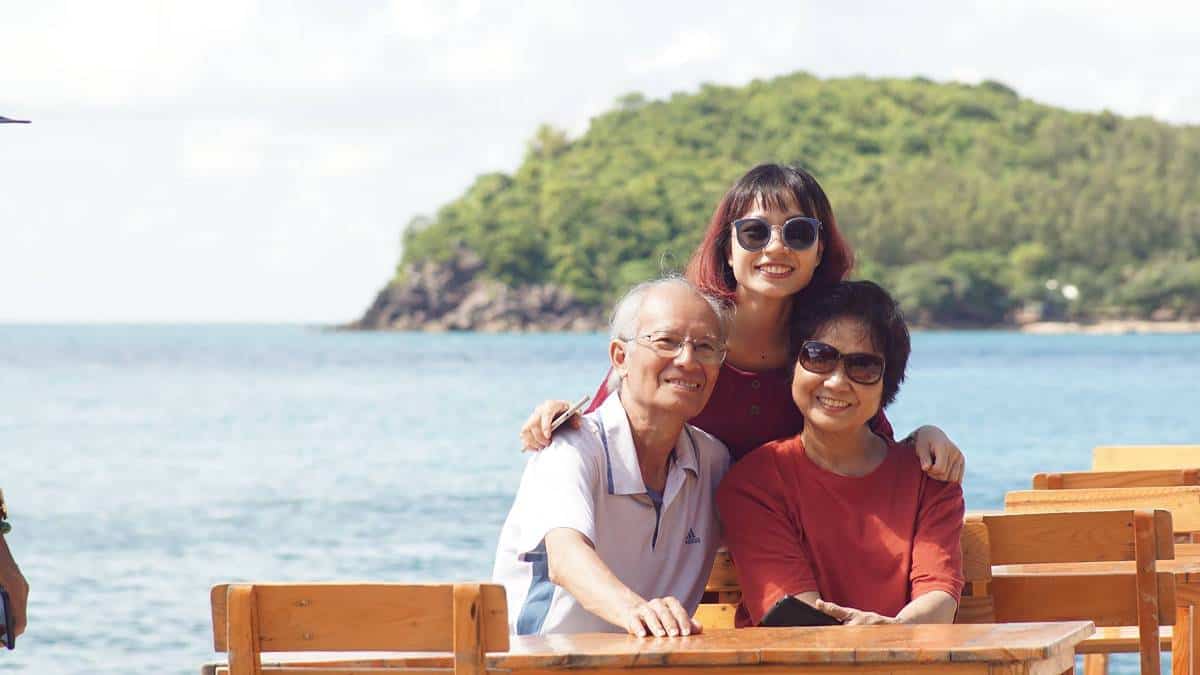Semi-Retirement in Thailand: A Guide To Retiring In Thailand
After spending 35+ years working in the United States, I discovered that semi-retirement in Thailand offered everything I was looking for – affordability, adventure, and a balanced lifestyle that let me work on my own terms while enjoying life to the fullest. Thailand’s combination of modern amenities and
Semi-Retirement in Thailand: A Guide To Retiring In Thailand
After spending 35+ years working in the United States, I discovered that semi-retirement in Thailand offered everything I was looking for – affordability, adventure, and a balanced lifestyle that let me work on my own terms while enjoying life to the fullest. Thailand’s combination of modern amenities and traditional charm creates the perfect backdrop for those of us who aren’t quite ready for full retirement but want more freedom and better value for our money.
Key Takeaways
- Semi-retirement in Thailand offers an affordable lifestyle. Monthly expenses average $1,500-$2,000, approximately 36% less than in the US.
- Multiple visa options exist for semi-retirees, including the Non-Immigrant O-A (Retirement Visa), Long-Term Resident Visa, and Thailand Elite program.
- Thailand boasts world-class healthcare facilities, a warm tropical climate year-round, and vibrant cultural experiences perfect for an active semi-retirement.
What is Semi-Retirement in Thailand?

Semi-retirement in Thailand means creating a lifestyle where you can wind down from your full-time career without completely stopping work. It’s about having the freedom to choose how much you work, when you work, and what kind of work you do, all while living in a beautiful country with significantly lower costs than the West.
For me, semi-retirement as an expat meant launching BetterLivingAsia while still having time to explore Thailand’s stunning beaches, mountains, and cities. Unlike traditional retirement, semi-retirement lets you maintain a purpose and income stream while enjoying a more relaxed pace of life.
Cost of Living for Semi-Retirees in Thailand
One of the biggest attractions for semi-retirement in Thailand is the affordable cost of living. Living in Thailand costs around 36% less than in the US, allowing you to live comfortably for approximately $1,500 per month. This dramatic difference means your retirement savings and part-time income can provide a lifestyle that would be impossible back home.
Housing
Housing costs in Thailand typically range from 15,000 to 60,000 Baht ($446 to $1,785) per month, depending on your preferences and location. In Bangkok, expect to pay more for Western-standard accommodations, while cities like Chiang Mai offer similar quality at about 20% less.
As a semi-retiree, you might consider purchasing a condo for long-term stability. Thai law allows foreigners to own condominiums outright, with decent options starting around 3 million Baht ($90,000).
Food and Dining
Food costs vary dramatically based on your eating habits. Embracing local Thai cuisine will save you significant money – a meal at a local restaurant costs 60-100 Baht ($2-3), while international restaurants charge 300-600 Baht ($9-18) per meal.
Healthcare
Healthcare is a critical consideration for semi-retirees, and Thailand excels in this area. Thailand’s health system ranks among the top five countries with the greatest number of JCI-accredited healthcare facilities.
Private hospitals like Bumrungrad International offer world-class care at 50-70% less than comparable services in the US. Many semi-retirees opt for local health insurance policies, which cost significantly less than international coverage.
Visa Options for Semi-Retirees in Thailand
Thailand offers several visa options suitable for semi-retirees:
Non-Immigrant O-A (Retirement Visa)
Available to foreigners 50 years and older, these visas are valid for one year and prohibit formal employment. Financial requirements include either:
- 800,000 Baht ($24,000) in a Thai bank account
- Monthly income of at least 65,000 Baht ($1,950)
- A combination of savings and income equaling 800,000 Baht annually
While this visa prohibits formal employment, it doesn’t prevent you from earning passive income from investments or online businesses managed from Thailand.
Long-Term Resident (LTR) Visa
This newer option provides a 10-year visa with simplified reporting requirements and potential tax benefits. The financial threshold is higher than the standard retirement visa, but it offers significant advantages for semi-retirees with substantial assets.
Thailand Elite Visa Program
For those seeking maximum convenience, the Thailand Elite program provides visas for 5-20 years with premium services. Membership fees start at 900,000 Baht ($27,000) for a 5-year visa.
Best Locations for Semi-Retirement in Thailand

Bangkok
Thailand’s capital offers unmatched urban amenities, excellent healthcare, and extensive networking opportunities. The city is ideal for those who want to maintain professional connections while enjoying a cosmopolitan lifestyle.
Chiang Mai
The northern cultural capital offers a perfect blend of traditional Thai culture and modern amenities at lower costs than Bangkok. Chiang Mai’s digital nomad scene provides networking opportunities for those maintaining online businesses.
Hua Hin
This royal beach resort town offers a relaxed coastal lifestyle with excellent infrastructure. The moderate pace, golf courses, and proximity to Bangkok make it ideal for semi-retirees seeking balance.
Phuket
Thailand’s largest island offers beautiful beaches alongside sophisticated infrastructure. The island’s diverse communities support various semi-retirement lifestyles, from luxury living to budget-conscious options.
Working and Earning in Semi-Retirement
While Thailand’s retirement visa prohibits formal employment, semi-retirees have numerous options for generating income:
Remote Work and Consulting
Many semi-retirees maintain part-time consulting relationships with former employers or clients. Thailand’s improving internet infrastructure facilitates these arrangements.
Online Businesses
Digital entrepreneurship thrives among semi-retirees in Thailand. From e-commerce and content creation to online teaching, the digital economy allows semi-retirees to earn without violating visa restrictions.
Investment Income
Managing investments becomes a common activity for semi-retirees. Thailand’s lower cost of living means dividend and interest income stretches further, allowing for a comfortable lifestyle with less drawdown on principal.
Balancing Work and Leisure in Thai Semi-Retirement
The art of semi-retirement in Thailand lies in striking the perfect work-leisure balance. Most expats I’ve met adopt a rhythm that maximizes both productivity and enjoyment:
The Tropical Work Schedule
Many semi-retirees embrace Thailand’s natural rhythms, working during the cooler morning hours (6-10am) and evening hours (4-8pm), leaving the hottest part of the day for leisure activities like swimming, reading, or taking a traditional Thai nap. This split schedule allows for productive work while respecting the tropical climate.
The “3-4-5” Approach
A popular pattern among successful semi-retirees is what I call the “3-4-5” approach: working 3-4 hours daily, 4-5 days weekly. This provides sufficient income while leaving ample time for exploration, socializing, and personal interests. Some concentrate their work into intensive “focus days” followed by completely work-free days for travel and leisure.
Seasonal Adaptation
Many semi-retirees align their work intensity with Thailand’s seasonal patterns, working more during the rainy season (roughly May-October) when outdoor activities are sometimes limited, and reducing workloads during the perfect weather of cool season (November-February) to maximize exploration and travel.
Cultural Adaptation and Daily Life
Successful semi-retirement in Thailand involves embracing cultural differences:
Language Considerations
While English is widely understood in tourist areas and professional settings, learning basic Thai phrases enhances daily interactions. Many semi-retirees take casual language classes or use apps to develop conversational skills.
Cultural Respect
Understanding Thai social norms regarding the monarchy, religion, and interpersonal interactions helps semi-retirees navigate their new home respectfully. Small courtesies like removing shoes before entering homes and temples make a positive impression.
Financial Management in Thai Semi-Retirement
Banking and Money Management
Opening a Thai bank account simplifies daily life and satisfies visa requirements. Most semi-retirees maintain accounts in both Thailand and their home country, using services like Wise for cost-effective international transfers.
Tax Considerations
Semi-retirees must understand tax obligations both in Thailand and their home country. US citizens, for example, must file US tax returns regardless of residence. Thailand generally doesn’t tax foreign-source income, creating potential advantages for semi-retirees with overseas earnings.
FAQs
Can I work legally during semi-retirement in Thailand?
How much money do I need to semi-retire comfortably in Thailand?
What happens if I need serious medical care in Thailand?
Can I buy property as a semi-retiree in Thailand?
How often do I need to report to Thai immigration?
Conclusion
Semi-retirement in Thailand offers a remarkable opportunity to redefine your life on your own terms. With careful planning, you can create a balanced lifestyle that blends part-time work with leisure in a beautiful, affordable setting. Whether you’re seeking adventure, community, or simply a better quality of life, Thailand provides the perfect backdrop for this exciting life chapter.
Ready to explore semi-retirement in Thailand? Let’s have a short talk for personalized guidance and resources to help you transition smoothly to your new life. Your semi-retirement journey starts with a single step – take it today!





